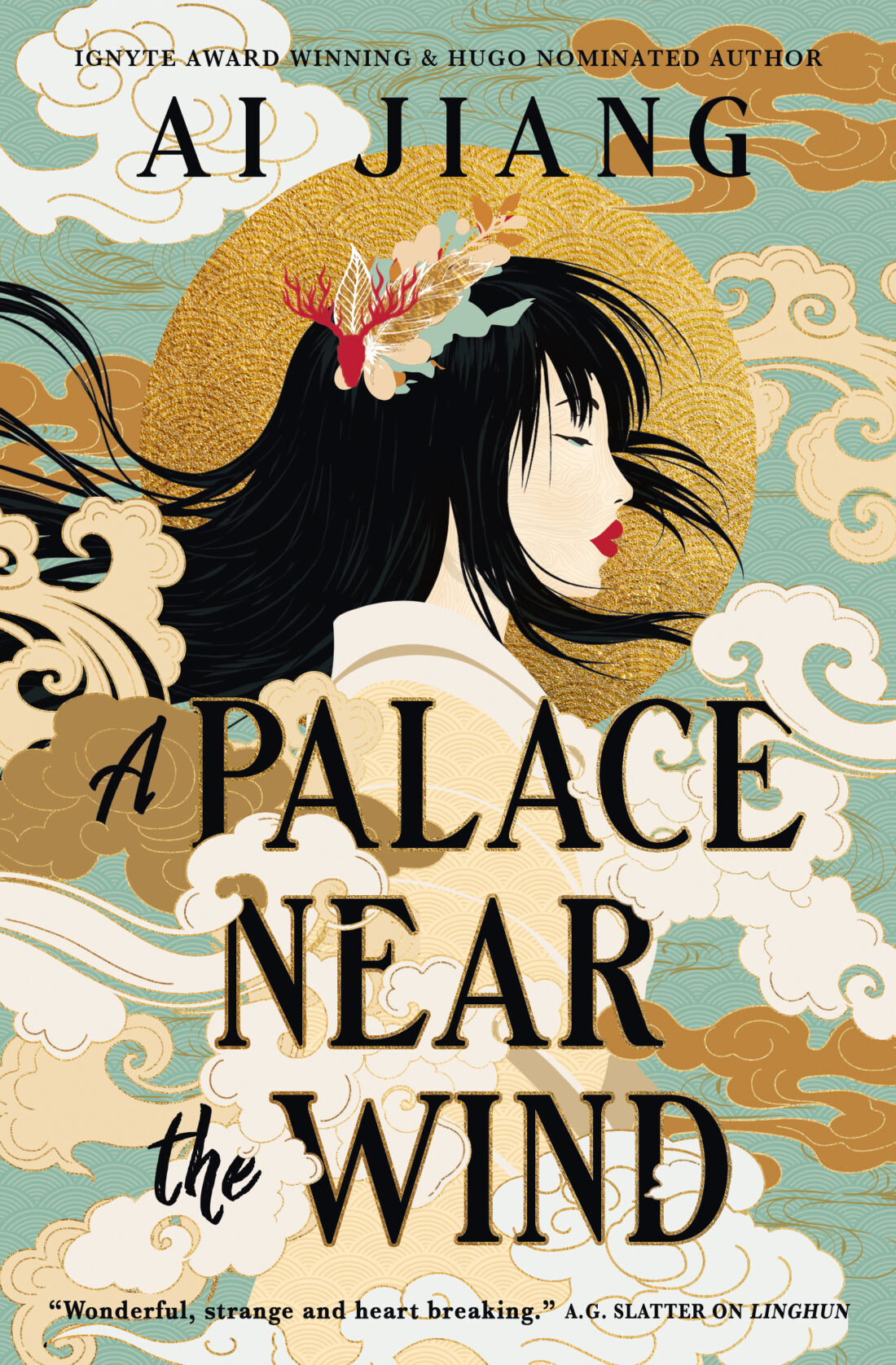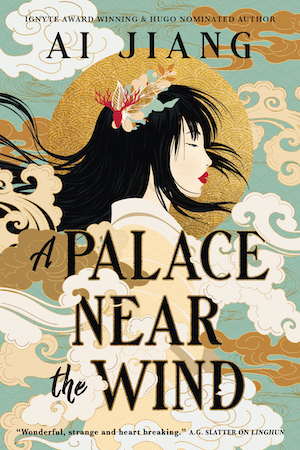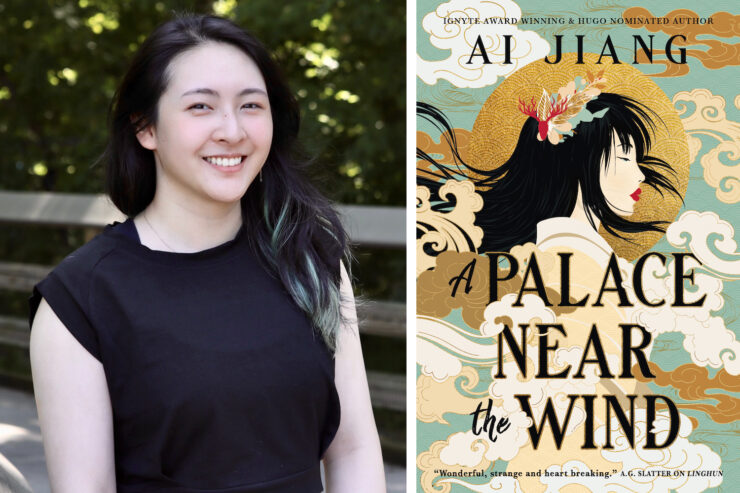We’re thrilled to share the cover and preview an excerpt from A Palace Near the Wind, a science-fantasy novella from author Ai Jiang. A story of family, loss, oppression and rebellion, A Palace Near the Wind will be available on April 8, 2025 from Titan Books.
Sometimes called Wind Walkers for their ability to command the wind, unlike their human rulers, the Feng people have bark faces, carved limbs, arms of braided branches, and hair of needle threads. Bound by duty and tradition, Liu Lufeng, the eldest princess of the Feng royalty, is the next bride to the human king. The negotiation of bridewealth is the only way to stop the expansion of the humans so that the Feng can keep their lands, people, and culture intact. As the eldest, Lufeng should be the next in line to lead the people of Feng, and in the past, that made her sisters disposable. Thankful that her youngest sister, Chuiliu, is too young for a sacrificial marriage, she steps in with plans to kill the king to finally stop the marriages.
But when she starts to uncover the truth about her peoples’ origins and realizes Chuiliu will never be safe from the humans, she must learn to let go of duty and tradition, choose her allies carefully, and risk the unknown in order to free her family and shape her own fate.
A powerfully imaginative, compelling story of a young woman seeking to save her family and her home, as well as a devastating meditation on the destruction of the natural world for the sake of an industrial future.

Ai Jiang is a Chinese-Canadian writer, Ignyte Award winner, Hugo, Astounding, Nebula, Locus, Bram Stoker, and BFSA Award finalist, and an immigrant from Fujian currently residing in Toronto, Ontario. Her work can be found in F&SF, The Dark, Uncanny, The Masters Review, among others. She is the recipient of Odyssey Workshop’s 2022 Fresh Voices Scholarship and the author of Linghun and I AM AI. Find her on X, Insta, and on her website.
Buy the Book


A Palace Near the Wind
BRIDEWEALTH
The youngest of my sisters, Chuiliu, blew on the white and blue rain blooms, clutching onto their navy stems. The dozens of slender arms attached at its tip held onto teardrop-like blubs. Her breath scattered the seeds so they may travel and grow elsewhere.
One ancient story passed down in Feng told of the floating seeds helping blowers find what they seek. There was little doubt my sister and I were praying for the same: to find our sisters and Mother. We had been denying the possibility of their death for the annuals they had spent, sight unseen, within the Palace. Surely, if my sisters and Mother were alive, they would have made contact, and the King would not need to wed more of the women in our family. But we refused to believe they had passed. Grandmother would have said. We would have held a funeral.
All we held now was our silence.
A sob welled up within me as I recalled my childhood, when my three missing younger sisters, along with our mother, were still in Feng rather than within the King’s clutches. Back then, it felt as though our home were in an eternal spring. At dusk, in the rain bloom fields, my sisters and I offered whispers of our dreams of love, of age, of adventure. Mother always watched, settled under a nearby storm tree, a gentle smile reaching her eyes.
Even now with sunlight beckoning the forest to stretch its limbs and drink its rays, the warmth was not comforting. It battered my body, scorching me, igniting the pent-up anger and sorrow I stored within me.
It had been three annuals since Sangshu, my fourth sister, married the King. She would be twenty-three annuals if she was alive. Hopefully she and my mother, and Yunshu and Heshi—my second and third sisters—are still breathing.
Chuiliu was unaware of my sorrow as I shielded my face from her. I imagined the rain bloom droplets lifting into the sky with my own sap tears.
“Will the seeds find them?” Chuiliu asked, her eyes like earthy moons.
“The natural gods and the wind will guide them,” I said, a lie.
I, too, would soon be married to the King. I couldn’t tell her I would act as her seeking rain bloom. All she had to do was wait for my return.
“Lufeng,” Grandmother’s voice drifted from behind. “It is time.”
I patted Chuiliu on the head, her dark needlethreads soft against the rough bark of my skin, and nudged her toward the cluster of hollows that made up our home in Feng. Reluctant at first, her shoulders then drooped before she trotted toward the storm trees. Grandmother and I waited until she disappeared into the forest’s embrace.
* * *
Two individuals must settle the negotiation of bridewealth; they must be close—yet not too close—to the soon-to-be-married couple’s families.
My mother’s sister, Xiangmu, and Copper, the King’s aunt, would meet to negotiate the terms for my marriage to the King. The grounds of the Palace were stretching forth again, growing closer and closer to our home in Feng. Only through the marriages would there be a chance to halt the expansions.
This was the first time marriage negotiations were taking place in Feng.
I followed Grandmother away from the rain bloom fields toward the edge of Feng and waited for Copper to exit the Palace. The large storm tree leaves, grey, shifting, like a slice of dark sky and clouds contained within the naturally serrated edges, obscured half our bodies. Driven by slivers of passing wind, the tree brewed small hurricanes and tornadoes, a flurry of branches and trunks intertwining, as though our hands might be whisked away upon contact. Only soft tickles graced our fingertips when we brushed the storm leaves aside, like collected dust, touchable clouds, soft tumbleweeds.
The gates of the Palace yawned like the opening of a freshly dug grave. Settled on top of a bulky and imposing Traveller, Copper towered over those of both the Palace guards’. The controlled strides of the mechanical legs creaked metallically, resounding between the Palace and our home in Feng. The Palace was too far for human ears. It was an hour away if travelling by wind, less on a Traveller. But sound met us early. The same with sight. Grandmother, nearing a century, could see every detail of a single feather on a bird’s wing several gusts of winds away.
Copper and the Palace guards moved forth in too steady a rhythm, unlike the sporadic, untimed clash of thunder and flash of lightning. The Traveller’s silver legs with feet resembled the talons of birds, something that should be natural but wasn’t. The guards’ Travellers were half the height of Copper’s and flanked both ahead and behind. Pooled over them were black cloaks with the hoods drawn up, reaching just before the lips.
Copper’s smooth, bronzed skin and slender arms were so unlike our own rough bark faces and carved branch limbs. Her white cloak billowed behind her, and her hood framed her face. Human, that’s what Grandmother called her and most of those who lived within the Palace. And what are we? I had asked when I was younger. We are the people of Feng and Feng itself—a part of the trees, a part of the wind—was Grandmother’s answer—Just as we borrow the wind, the wind also borrows us.
The walls extending skywards around the Palace grazed the clouds. The Palace itself looked as though it were encased in a bone mold—rigid, still… dead. Few had seen past the walls, nor the other half of the Palace. I imagined it would be a mirror image of what loomed in front of me. Along the bottom, there were more tiles waiting to be placed, stacked on top of uprooted trees and dead undergrowth like feeble fingers clutching, scraping, futile.
If I had the power, if the wind ever allowed—though I knew the natural gods were never in favour of chaos—I would show the King what it was like to have your home threatened, to feel attacked, to be afraid. And I would mock his terror in silence.
At the abrupt end of the bone-like, stone-tiled path that stretched in a straight line the width of a large forest stream, the three halted in unison halfway to Feng. The guards retreated, and Copper continued forth alone. I winced as the metal talons of her Traveller sank into the grass, uprooting with each step, leaving scars that marred our lands the way I wanted to mar the King and his people’s lives.
Grandmother had gone to speak with Aunt Xiangmu.
When Copper neared, seeming like only moments later, though the sun had already gone, I melted into the shadows and followed—unseen and unheard. Copper made for Aunt Xiangmu’s home near the heart of Feng.
The people of Feng had exited their hollows to watch with bowed heads as the King’s aunt passed, the guards now following at a distance. Some marvelled at the Traveller; some stared with scorn; a few fled inside their hollows, the sight being too horrific, while others stood, feet bracing both the earth beneath them and the wind hovering near them—sometimes we borrowed for travel, and other times we borrowed for strength.
Each step Copper’s Traveller took pierced into the organs of Feng. I reimagined the ground as Copper, the Traveller’s legs as my fingers, and the King as Aunt Xiangmu’s hollow.
* * *
Near the entrance of Aunt Xiangmu’s hollow sat Copper’s Traveller, legs withdrawn, with only the half shell body remaining settled on the ground. By the hollow opening perched the two guards, tall, erect, in their Travellers, though their height was nothing compared to the extending, intertwined roots reaching endlessly into the sky behind them, branches worming down into the earth. Next to Aunt Xiangmu’s home rippled from the ground the ancient roots of nearby trees. The hollow’s exterior had storm vines hanging from leaning trunks, which made it almost impossible to see inside. The woven branched walls rippled every few seconds, allowing small glimpses of the earthly chamber, now an intruded upon haven. I ran a hand along the body of the hollow—an empty trunk constructed by weavings, roofless; the ceiling disappeared into the surrounding trees. Though the people of Feng liked to call these homes hollows, I liked to call them eyes for the way they blinked.
I crouched on the other side of a shifting opening, caught a rippling, and tugged it to widen the gap.
During prior negotiations, Aunt Xiangmu would float toward the Palace, guided by the wind, by its courage, as though gliding on clouds, while my sisters, Grandmother, and I bid her a silent farewell half-hidden behind the walls of Feng—tangled, spiraling in place like churning clouds, rumbling storms. Perhaps this slight change, bringing a member of the Palace to us, meant we were making progress in reclaiming our lands. Or perhaps the King was only toying with us—giving us hope before taking it away.
“Fengfeng.” Chuiliu.
My youngest sister, even at full height, only reached my hip, and I was only past five feet, halfway to six—shorter than most of those in Feng. The Feng—Phoenix—in my name was not the same meaning as the Feng, Wind, of our home, but my sister, still having difficulties with the distinct tones, always made the mistake. She tugged at the end of my cloak, and I calmed as I leaned down.
Though Chuiliu was naturally quiet, her whispers sounded thunderous with only the wind against the grass and a single cricket’s call in the distance. I raised a finger to my lips and beckoned her closer.
“What are you doing?” she asked, lowering her voice until it was almost inaudible.
“Watching. Listening,” I said. My arms of braided and tangled branches wrapped around her slight frame and brought her to a squat. The only thing distinguishing our legs from one another was how new her roots looked: no moss, and their looseness made them appear like they would unravel if a strong breeze passed.
Together, we watched the negotiations unfold. I clutched Chuiliu’s hand harder than she was clutching mine. She reached behind me, offering rhythmic pats—the same way Mother used to soothe us all.
* * *
Aunt Xiangmu sat across from Copper in her dinner hollow, meant for welcoming guests not from Feng, hands settled on top of a scarred table made from the remains of our ancestors, their faces lit by a single candle almost burnt out—one Copper brought with her. I winced as drops of melted wax dripped onto the table, as if burning our dead.
Each aunt had an emptied shell filled with cool tea made from riverside herbs. We didn’t need such things, but we understood humans required a different nourishment. Water, sunlight, and moonlight were enough to sustain us. Humans were always picky, according to Aunt Xiangmu. Yet my younger sisters were always eager, hungry, to hear more about the Palace and its people. There is nothing better than our home, I used to remind them, as Grandmother would me. My sisters would sulk and return to playing in the rain bloom fields, or sometimes past those, swinging or crawling through vineyard thickets.
Copper pulled a second candle from her white cloak.
In Feng, we only borrowed Moonglows, tiny insects carrying Luna’s light in their bodies, and we always allowed them to leave when they wished. Though we didn’t really need the light, for our eyesight adjusted to the time of day, Moonglows were mainly for company, comfort, celebration. Yunshu and Heshi had a habit of beckoning Moonglows into their hairs, complimenting one another on the beauty of their needle threads. Chuiliu liked to stare in silence at nearby trees, Moonglows, up at the crescent or full of Luna, always with a small grin—a secret joke she wasn’t willing to share.
But there was also a different type of Moonglow with the same name, which grows where crescents hang, a slow juggle across the sky—light houses with gazing eyes picked and held in palms. For those of us injured or nearing death, Moonglows were ground, mixed, poured down throats, churned within ourselves to heal. It felt like the dim recollection of the sun at dawn, a small embrace during the nights. And sometimes, it was used for tea.
“Thank you,” Aunt Xiangmu began, gesturing to the tea in front of Copper. “For coming all the way here.”
“Well, the King wanted to extend his respects to the Wind Walkers. The situation has been uneasy between our people, hasn’t it?” Copper took a sip, wrinkled her nose. “It’s cold.”
“Is it not to your liking?” Aunt Xiangmu asked, taking a sip of her own tea, then cradled the cup in her hands as if for comfort.
Copper pressed her lips together. “No, no. Just… different.” The movement was slight, almost unnoticeable, but when Copper placed her shell down, she slid it away.
I held my tongue. I wondered if Aunt Xiangmu drank the hot tea she once spoke about being served at the Palace and had served Copper cold tea as an act of unspoken defiance.
“Hopefully, with this meeting, your people will become more,” Copper said, tapping a finger against the side of the shell, “settled with their concerns.”
“That will have to depend on whether you agree to our terms.” Aunt Xiangmu set down her tea, fingers tightening around the shell.
Excerpted from A Palace Near the Wind, copyright © 2024 by Ai Jiang










